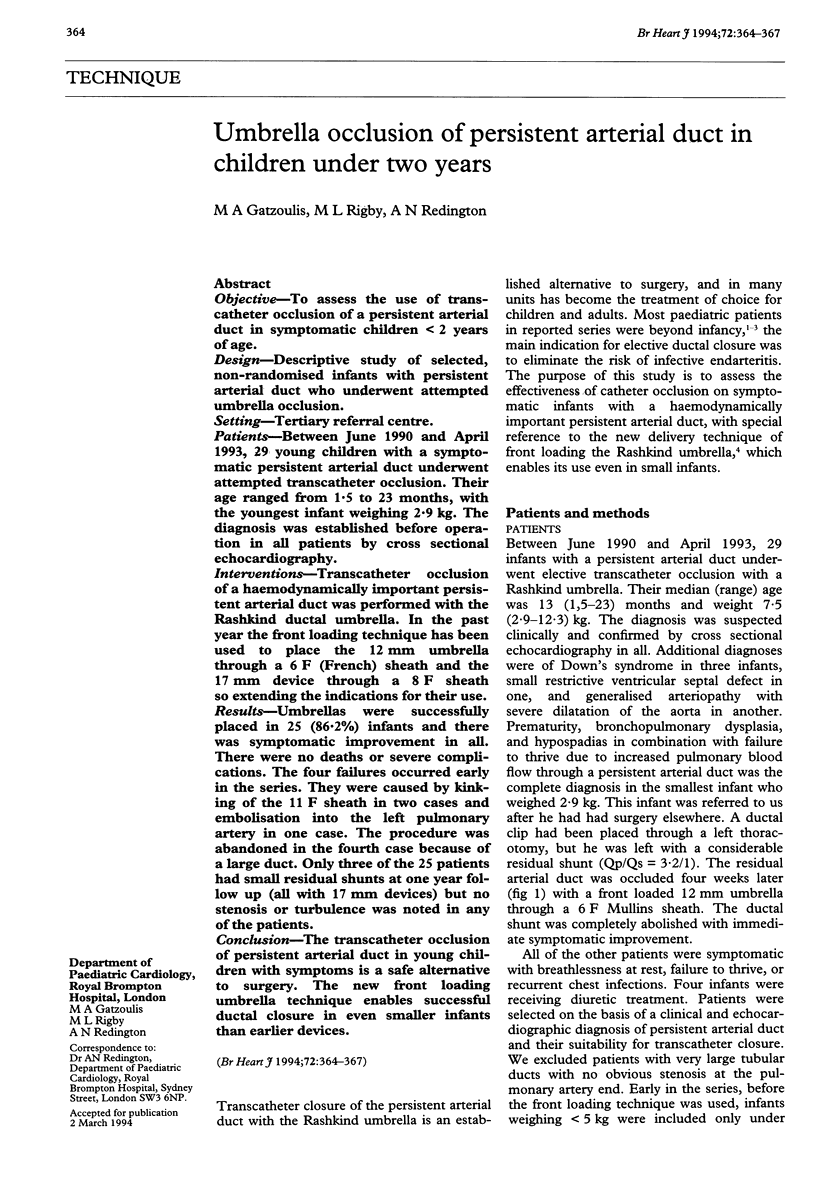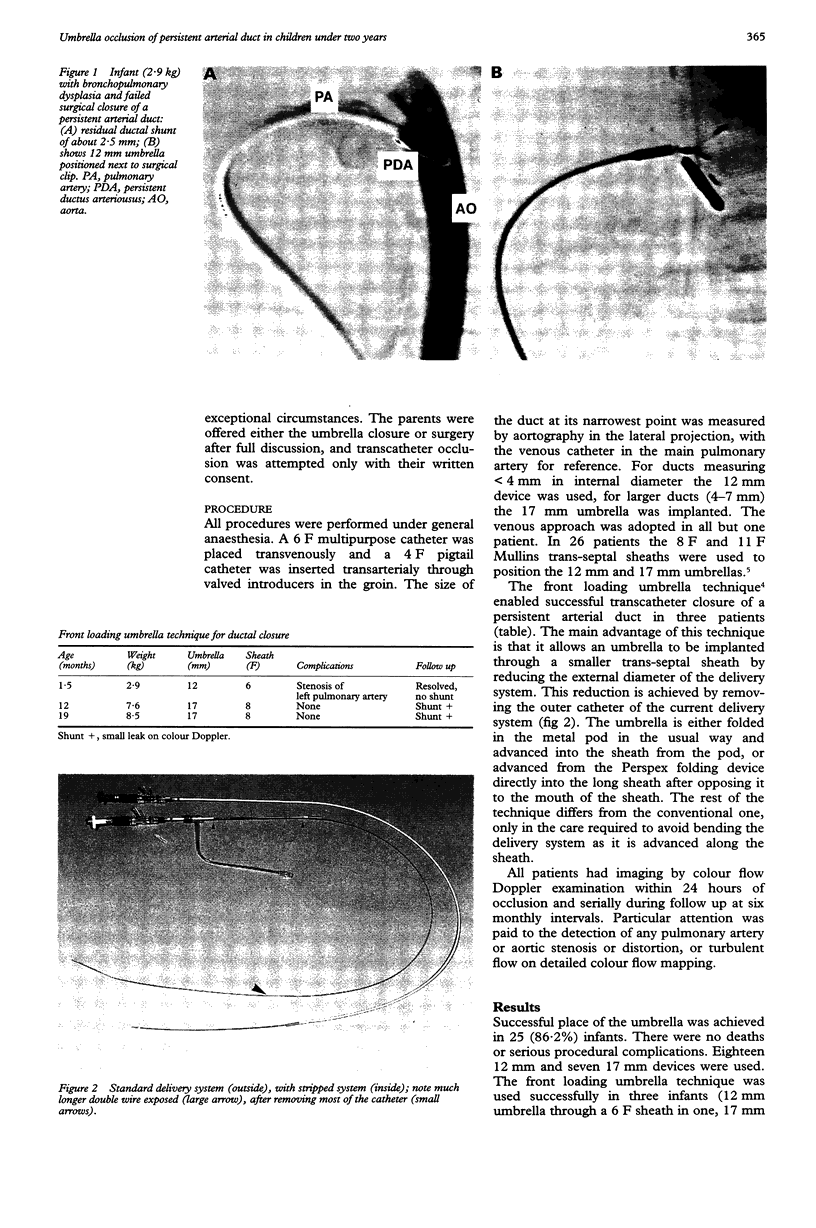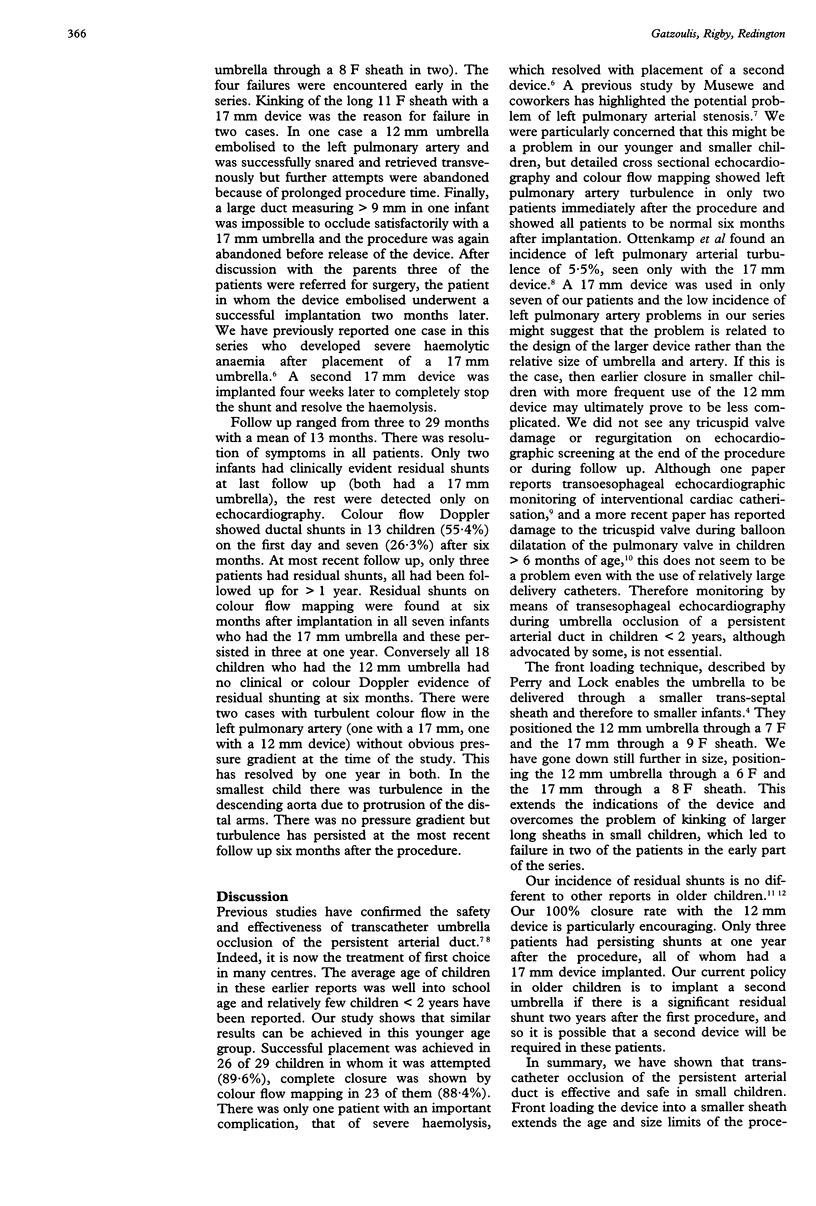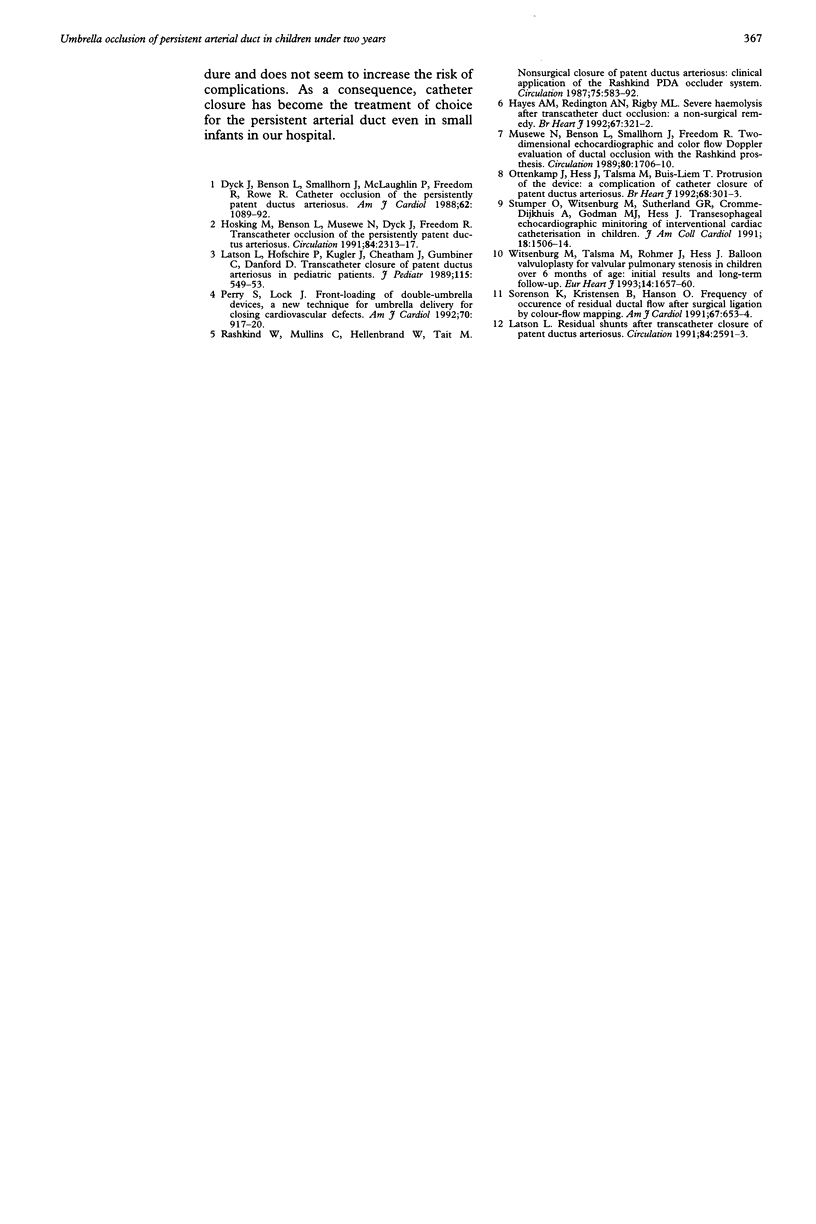Abstract
OBJECTIVE--To assess the use of trans-catheter occlusion of a persistent arterial duct in symptomatic children < 2 years of age. DESIGN--Descriptive study of selected, non-randomised infants with persistent arterial duct who underwent attempted umbrella occlusion. SETTING--Tertiary referral centre. PATIENTS--Between June 1990 and April 1993, 29 young children with a symptomatic persistent arterial duct underwent attempted transcatheter occlusion. Their age ranged from 1.5 to 23 months, with the youngest infant weighing 2.9 kg. The diagnosis was established before operation in all patients by cross sectional echocardiography. INTERVENTION--Transcatheter occlusion of a haemodynamically important persistent arterial duct was performed with the Rashkind ductal umbrella. In the past year the front loading technique has been used to place the 12 mm umbrella through a 6 F (French) sheath and the 17 mm device through a 8 F sheath so extending the indications for their use. RESULTS--Umbrellas were successfully placed in 25 (86.2%) infants and there was symptomatic improvement in all. There were no deaths or severe complications. The four failures occurred early in the series. They were caused by kinking of the 11 F sheath in two cases and embolisation into the left pulmonary artery in one case. The procedure was abandoned in the fourth case because of a large duct. Only three of the 25 patients had small residual shunts at one year follow up (all with 17 mm devices) but no stenosis or turbulence was noted in any of the patients. CONCLUSION--The transcatheter occlusion of persistent arterial duct in young children with symptoms is a safe alternative to surgery. The new front loading umbrella technique enables successful ductal closure in even smaller infants than earlier devices.
Full text
PDF



Images in this article
Selected References
These references are in PubMed. This may not be the complete list of references from this article.
- Dyck J. D., Benson L. N., Smallhorn J. F., McLaughlin P. R., Freedom R. M., Rowe R. D. Catheter occlusion of the persistently patent ductus arteriosus. Am J Cardiol. 1988 Nov 15;62(16):1089–1092. doi: 10.1016/0002-9149(88)90554-1. [DOI] [PubMed] [Google Scholar]
- Hayes A. M., Redington A. N., Rigby M. L. Severe haemolysis after transcatheter duct occlusion: a non-surgical remedy. Br Heart J. 1992 Apr;67(4):321–322. doi: 10.1136/hrt.67.4.321. [DOI] [PMC free article] [PubMed] [Google Scholar]
- Hosking M. C., Benson L. N., Musewe N., Dyck J. D., Freedom R. M. Transcatheter occlusion of the persistently patent ductus arteriosus. Forty-month follow-up and prevalence of residual shunting. Circulation. 1991 Dec;84(6):2313–2317. doi: 10.1161/01.cir.84.6.2313. [DOI] [PubMed] [Google Scholar]
- Latson L. A., Hofschire P. J., Kugler J. D., Cheatham J. P., Gumbiner C. H., Danford D. A. Transcatheter closure of patent ductus arteriosus in pediatric patients. J Pediatr. 1989 Oct;115(4):549–553. doi: 10.1016/s0022-3476(89)80279-3. [DOI] [PubMed] [Google Scholar]
- Latson L. A. Residual shunts after transcatheter closure of patent ductus arteriosus. A major concern or benign "techno-malady"? Circulation. 1991 Dec;84(6):2591–2593. doi: 10.1161/01.cir.84.6.2591. [DOI] [PubMed] [Google Scholar]
- Musewe N. N., Benson L. N., Smallhorn J. F., Freedom R. M. Two-dimensional echocardiographic and color flow Doppler evaluation of ductal occlusion with the Rashkind prosthesis. Circulation. 1989 Dec;80(6):1706–1710. doi: 10.1161/01.cir.80.6.1706. [DOI] [PubMed] [Google Scholar]
- Ottenkamp J., Hess J., Talsma M. D., Buis-Liem T. N. Protrusion of the device: a complication of catheter closure of patent ductus arteriosus. Br Heart J. 1992 Sep;68(3):301–303. doi: 10.1136/hrt.68.9.301. [DOI] [PMC free article] [PubMed] [Google Scholar]
- Perry S. B., Lock J. E. Front-loading of double-umbrella devices, a new technique for umbrella delivery for closing cardiovascular defects. Am J Cardiol. 1992 Oct 1;70(9):917–920. doi: 10.1016/0002-9149(92)90738-k. [DOI] [PubMed] [Google Scholar]
- Rashkind W. J., Mullins C. E., Hellenbrand W. E., Tait M. A. Nonsurgical closure of patent ductus arteriosus: clinical application of the Rashkind PDA Occluder System. Circulation. 1987 Mar;75(3):583–592. doi: 10.1161/01.cir.75.3.583. [DOI] [PubMed] [Google Scholar]
- Stümper O., Witsenburg M., Sutherland G. R., Cromme-Dijkhuis A., Godman M. J., Hess J. Transesophageal echocardiographic monitoring of interventional cardiac catheterization in children. J Am Coll Cardiol. 1991 Nov 15;18(6):1506–1514. doi: 10.1016/0735-1097(91)90682-y. [DOI] [PubMed] [Google Scholar]
- Witsenburg M., Talsma M., Rohmer J., Hess J. Balloon valvuloplasty for valvular pulmonary stenosis in children over 6 months of age: initial results and long-term follow-up. Eur Heart J. 1993 Dec;14(12):1657–1660. doi: 10.1093/eurheartj/14.12.1657. [DOI] [PubMed] [Google Scholar]




